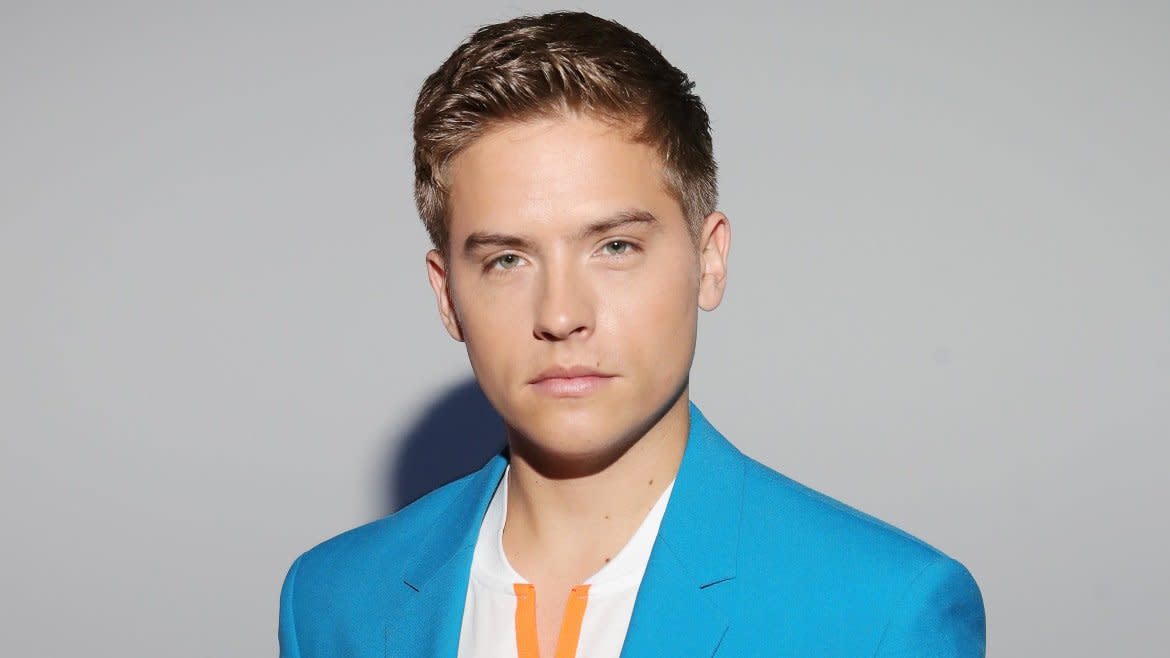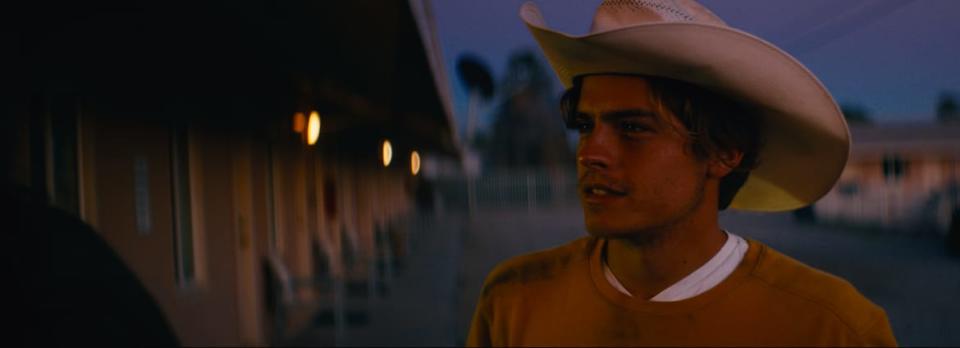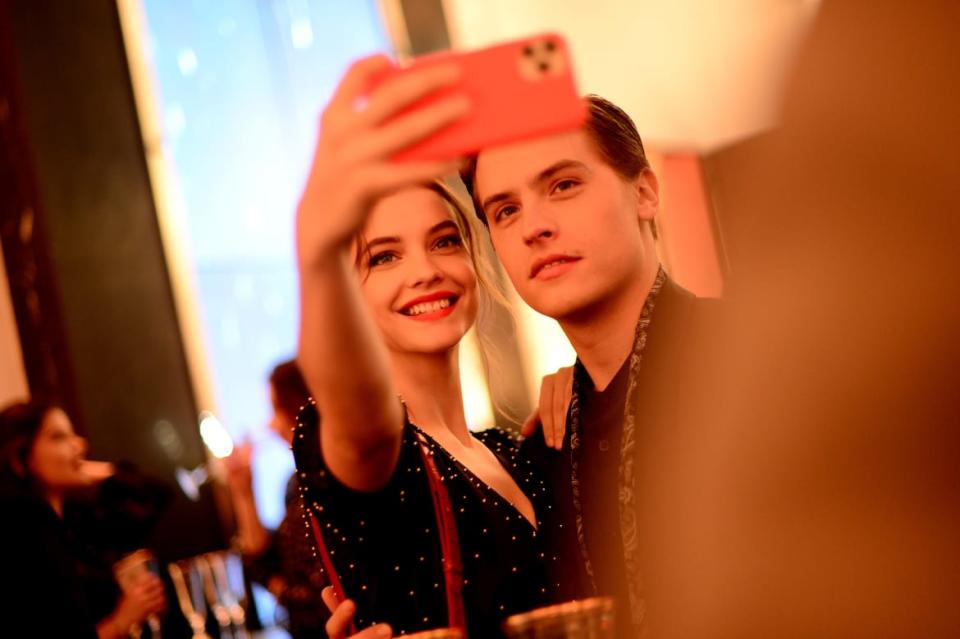Dylan Sprouse Reckons With His Disney Past and Looks Toward the Future

- Oops!Something went wrong.Please try again later.
In Daddy, a young male escort dons a bright pink dress and is tasked with raising the spirits of a broken 80-year-old man (Ron Rifkin) on the anniversary of his wife’s passing. Set almost entirely in a palatial hotel suite, it’s a tender two-hander about the need for human connection. The YouTube comments underneath the short film, however, tell a different story. “This Zach & Cody’s episode is very weird,” wrote one user, whose remark garnered 15K likes. “…you’re 30 seconds into the video and your [sic] looking in the comments thinking what the f am I watching?” wondered another.
The reason these Gen Zers are so damn befuddled is because the striking escort is played by none other than Dylan Sprouse. For years, Dylan and his twin brother Cole starred in The Suite Life of Zack & Cody, a hit Disney series that saw the Sprouse boys amass a devoted tween following and also made them the highest-paid Disney child stars on the planet. (Millennials are more familiar with the Sprouses’ role as the adopted child in Big Daddy.) While Cole has become something of a CW teen idol thanks to a starring role on Riverdale, Dylan has carved a different path, appearing in indie dramas, voicing video game characters, and operating the All-Wise Meadery in Williamsburg, Brooklyn—a nod to his belief in Heathenism.
Fans of The Suite Life will likely be surprised by the 28-year-old’s latest role, too: as a drug addict named Luke who falls for a fellow drifter in Kerry Mondragon’s Tyger Tyger, a surreal neo-Western set in a future society thrown off its axis by a pandemic, and where many of its younger inhabitants are slaves to opioids. It was filmed on location in Bombay Beach, California, about a year before the real-life COVID pandemic hit, and incorporated many of the bohemian locals as characters in the movie.
Shockingly Real Tom Cruise Deepfakes Are Invading TikTok
“The locals down there call it ‘The Magical Vortex,’ because time seems to move differently down there,” says Sprouse. “It’s a very intriguing place.”
In a wide-ranging conversation, I spoke to Sprouse about his renewed passion for acting and why he finally feels in control.
Was Tyger Tyger shot pre-pandemic or just incredibly prescient?
It’s funny, right? It was shot pre-pandemic, but in general, that’s kind of how some of these things work. Writers have this way of channeling the state of the world as it’s going to be, so it was definitely coincidental, and all of us were looking around confused when the pandemic went down.

Dylan Sprouse in Tyger Tyger
It is wild. The anxiety around mask-wearing plays a large role in the film. And the film itself is quite experimental.
It’s crazy. I have a taste for experimental stuff, personally, so on face level, that was definitely part of it. I liked how visual it was—I’m a visual guy, and Kerry [Mondragon] did a good job of writing the script in a very visual way. But when I sat down with him initially, and we were talking about love, and we were talking about drug addiction, and we were talking about how he was going to do this in such a guerrilla setting, I was taken by it. I knew it was going to be a real experience shooting it. It remains still one of the most memorable shooting experiences I’ve ever had.
You guys actually filmed in Slab City and used locals as extras.
As far as it being done before, it’s very, very rare. Slab City folks don’t generally like people who are going to abuse the area in a commercial way, so Kerry had been down there for months prior talking to them about how we were going to shoot it, and once he got the go-ahead, the Slab City people welcomed us with open arms, so long as we were respectful and cool to them. Some of the extras that we had—and some of the actors that we had—we would call them the next day and they had jumped trains going to their next spot.
Tyger Tyger is set in this dystopian future where large swaths of the population have become hopelessly addicted to opioids and the government is doing next to nothing to help them—so not terribly far from our current reality.
The truth of it—yeah. Kerry is very open about how he had struggled with opioids himself, so this is definitely addressing a lot of his own experiences in a very fantastical way, but this is also about the addiction to love, and chasing the feeling of it. The backbone of it is the opioid crisis, but this is much more an addiction to things in general, I think.
Did you bring some of your own experience into it? Have you ever found yourself addicted to a person or thing?
We all have our own addictions, if we’re going to make a very broad statement about it. I have experienced firsthand, in my family, addiction to drugs, so utilizing that—as well as Kerry, the director’s advice, and some of the experiences of the crew and the actors on set—we could properly convey what it was in this setting. And Luke’s character is in love with everything. There could be addicts by nature, and that’s because their nature is to experiment with everything. They have a great taste for life, and once they find the things they love, they latch onto it very closely—and sometimes, that is a substance. Another thing we really wanted to make sure is that its depiction isn’t all grim and glum, because that’s never the way it always is. You see movies about these topics and there’s a scene where someone sticks their hand out of a car window and feels the wind blowing through their fingers, and it’s so dark and depressing. The sad truth of it is, sometimes these things make you feel great.
You mentioned experiencing addiction firsthand in your family. What was that like, and how did it affect you?
I won’t speak too much on it, but it definitely informed a lot of my decision-making. Even as an actor, experiencing firsthand what that looks like informs your decision of how to depict it and portray it, right? The difficulty of a lot of that stuff is this idea of getting well. A lot of times, people who are substance abusers seem at their best when they’re on substances—it’s the withdrawal that makes them scary to look at and so clearly drug users. So, you can forget that they’re using. We had to find a way to depict that.
I enjoyed your short film, Daddy. It’s funny because I went into the YouTube comments and it’s all Suite Life people being confused about what they were watching. It must be strange and fascinating to have a large fan base trailing you who have one idea of you and are expecting a certain thing, and then to zag and disrupt those expectations.
What I would like to convey to the people I’m very thankful for who continue to follow me on my own actor’s path is that I choose very deliberately what I like to do—and the truth is, it’s what I like to do. Filming for me recently has been—this is almost a little too brash, but for lack of a better sentence, it’s free of monetary necessity, and I’m really doing it because I like the team involved, I like the experience, I like the story, I think they’re beautiful, and I think they have things to say. I think generally, people are unused to seeing that. The audience demands a similar standard of all actors and actresses once they’ve done something, and I think if I confuse people and confound people with the choices I’m making, it makes me happy to a degree, but I also hope they know that this is the stuff I like to do. As much as I’d enjoy doing big, blockbuster things, I also truly love making things for the experience of it. When comments like that rise up, I look at them and smile.
Does that desire to chase passion projects “free of monetary necessity” have to do with the years you spent being part of the Disney machine, appearing in a sort of packaged product that came out regularly?
I wouldn’t say that it’s Disney exclusively. I think this has everything to do with the industry as a whole, and what it demands, and how the industry is turning particularly young kids into money-making machines. I don’t think it’s necessarily wrong, but I think it represents a moral gray area. I have a particular discontent with work I was put into when I was young that was by necessity—of course, for my family and my wellbeing, and I’m thankful for that—but also left me with virtually no agency. I think now I chase that agency a little bit, and it’s a way to take acting back into my own hands a little bit. Back then, I was acting and enjoyed it, but it wasn’t my full choice—it was because I had to do so. So, that’s my response to the industry as a whole. One day, I’m sure there will be a big fuck you to everybody involved, but also a big thank you. And I think those things go hand-in-hand in this industry. You have to flip some people off with one hand and thank some people with the other.
Was going to NYU—and stepping back from Hollywood—an important step in reclaiming your agency and exploring what you really wanted to do?
Yeah, certainly. Usually, work doesn’t start for ninety-nine percent of human beings until their late teens, and for me starting out working very young, I just wanted to explore who I was as a person more and learn. That informed me of myself without work, and the things that I held dear and close to me. It was necessary. The search for agency is not going to be a big payoff until it is. I’m not going to fool anyone into thinking that doing what you want most of the time will result in a huge payoff. But in terms of spiritually? It’s much more gratifying. And acting exists like that for me. In order to take it back truly into my own hands, it has to be spiritually gratifying first and foremost.
And your journey to fuller agency is different than most people’s because you were tethered to your brother for so long, which makes it quite a unique journey to carve your own path.
Truly. My brother and I talk about this at length, and if there’s anything that we know, it’s that this is a fight we both fight together in very different ways. At the end of the day, we are aligned in that respect. But there’s also that question: Does the industry care that there’s two? At first they might, but insofar as twins exist as a whole, it’s not like we’re going to get twin roles. There are only one or two every few years, and they usually just hire the same actor and green screen it, so that wasn’t really a reality. So, does the industry care? No, not necessarily. Are we supposed to make them? No, not necessarily. I think it’s certainly an interesting thing, and Cole and I have a lot of different names. We both get called each other’s names, and we both get called each other’s character’s, so to differentiate is not something that’s necessarily our modus operandi, but it’s a conversation piece! But it’s not something that we’re actively chasing, by nature of us growing up and having different tastes.

Dylan Sprouse and Cole Sprouse attend the Five Feet Apart Los Angeles premiere on March 07, 2019, in Los Angeles, California.
At the same time, is it nice to have someone facing similar struggles as you are in the industry, and someone to confide in and bounce ideas off of?
Oh, definitely. Cole and I have very different struggles, though, in terms of our work. I was very particular about not wanting to do television for a long time, and that was my personal decision. Cole was less particular about that, obviously, but I think I was particular about it because I had a hunger to differentiate my roles, and knew that if I was locked into television, I wouldn’t be able to have a shorter gestation period with some of the characters I wanted to portray at that time. I was very gung-ho on doing films, and our paths definitely diverged in that respect, but we are acutely aware of the struggles of one another as well.
How’s the meadery doing? I walk by it in Brooklyn all the time.
Well, we shut down our tasting room for the pandemic because it wasn’t a big operating space to begin with. The bummer was, we were right in the middle of building out our bar downstairs as the pandemic hit in full force, and we thought, “Even if we opened it up after the pandemic it wouldn’t be at full capacity, so it will just be a money-sink for the business,” so we put an indefinite hold on opening the bar during the pandemic. That being said, our online sales have done very well, so we’re actually looking into getting a bigger facility for our manufacturing space.

Barbara Palvin and boyfriend Dylan Sprouse attend The Kooples Magical Night presented by Kooples on January 08, 2020, in Paris, France.
I’m curious when you decided to adopt Heathenism, and what attracted you to it?
It’s been a long time for me, and it’s been kind of all over the map. With Heathenism, I probably started practicing when I was 15. I’ve really always been a solo practitioner. I’ve been to a lot of groups and met a lot of fellow Heathens, and I’ve frankly met a lot of unsavory Heathens—and then I’ve met a lot of savory Heathens. Like any faith, they come in both of those flavors. But I have a much more universalist understanding of the faith. I found it because I was just in love with the morals, the values, and the fuckin’ stories. I just found it to be so cool, and it’s always been fun for me—to have a path to believe in. And it’s led to so many positive things for me, like the meadery, for example.
With Daddy, Tyger Tyger, and the upcoming Turandot, these are very different roles—and projects. Do you feel reinvigorated when it comes to acting?
You know man, I do. Well, I do and I don’t, because I don’t feel that that path is fully done. When we were talking earlier about how the industry views me, and how they view my brother, and really how anyone sees you, I feel like my voice is louder than it has been, but I don’t feel like people are fully seeing me for who I am as a creative yet. I think I have a lot more work to do in that respect, and I have a lot more personal growth to make too. I think I have to be more honest with myself in the choices, decisions, and things I want to do; and if those things don’t come to me, I have to work with people who can make those things a reality. So, yes, I feel invigorated, but I certainly think I’m far from the finish line.
So, I heard that HBO’s The Sex Lives of College Girls isn’t happening for you now?
Sex Lives is on a hiatus right now. The funny thing is, man, if I’m going to be fully honest, I can’t tell you what fully happened, but I will say this: in terms of me as a performer, the things that I want to do and the person that I want to be, if I pretend to do things that are against my mission statement, people will see through them. And I’ve been on sets long enough to know that there were signs for me that it wasn’t right, and I was ignoring them on purpose. I was telling myself that this is what I should be doing, but deep down I knew. And that’s part of what I mean, as far as my personal growth in being a performer or a creative in general. I have to be more honest in identifying the things that I love to do.
Got a tip? Send it to The Daily Beast here
Get our top stories in your inbox every day. Sign up now!
Daily Beast Membership: Beast Inside goes deeper on the stories that matter to you. Learn more.

